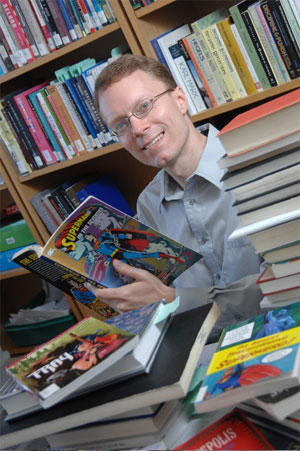 |
| Prof. Anthony Enns collected comic books as a kid and now he's teaching a course about them. (Danny Abriel Photo) |
Itâs official: comics are cool. The Dark Knight steamrolled its competition at the multiplex, Japanese âmangaâ comics are stocked en masse at your local library, and Free Comic Book Day is celebrated on the first Saturday of May throughout North America.
All signs say that the comic bookâer, âgraphic novelââis enjoying an unexpected renaissance. Perhaps itâs no surprise then, that one of ±«Óătvâs newest courses will be taught with the help of Donald Duck, Wonder Woman and maybe even Dr. Seuss.
This winter, (ENGL 2080)Â is joining the Department of Englishâs offerings.
âThe department was looking for this kind of a course for a while, since before I came here,â says Anthony Enns, cultural theorist and ±«Óătv professor. Julia Wright, Dal professor and Canada Research Chair in European Studies, proposed the course and wrote the syllabus, but Prof. Enns, currently working on a critical essay about comic books, is taking the reins.
English 2080 will trace the history of cartoons and comics, from 18th- and 19th-century political propaganda to the golden age of Marvel and DC.
âThere are many different ways to teach (this course),â says Prof. Enns. âOne obvious (way) would be to take a strict literary approachâread more highbrow comic books and make an argument for comic books as literature⊠If you were going to teach the course that way, I think you would probably not bother to teach superheroes. I think that would be a mistake.
âSo much of graphic material is made up of the superhero genre. It would be wrong to just ignore it.â
Cultural ideologies
But what kind of cultural ideologies could possibly be encoded in kryptonite and batmobiles? âI was thinking I was going to do a unit on Wonder Woman,â he says. âIs Wonder Woman a strong feminist figure, or is she a kind of a sex kitten? ... (William Moulton) Marston, the creator, was really into S and M, he loved being tied up ⊠thereâs some aspect of sexual titillation to the Wonder Woman character.â
Wonder Womanâs male co-workers are not exempt from similar inspection. âFor Batman, Iâm going to do homosexuality ⊠There are some articles championing Batman as a sort of queer hero.â He is bemused by the Robin-less state of most modern Batman literature; the Boy Wonder was conspicuously absent from blockbusters Batman Begins and The Dark Knight. â(Frank) Millerâs Dark Knight Returns turns Robin into a woman⊠(Miller) really tries to avoid the whole Batman/Robin relationship.â
Hardcore comickers will not be surprised that classic superhero controversies will be taughtâthey date back to the decency debates of the early 20th century. But even the most serious fans may be startled to hear about other items in Prof. Ennâs curriculumâfor instance, a possible unit on Donald Duck. The problem isnât Donaldâs lack of pants; rather, itâs the imperialist ideology he presents. In fact, childrenâs literature is often loaded with cultural implications. âBabar is often read as a parable about colonialism,â Prof. Enns explains. âBabar is educated in Europe and thatâs the reason why heâs the king of the elephants.â
Prof. Enns is also well-versed in more traditionally highbrow graphic novels, such as Art Spiegelmanâs Pulitzer-winner Maus, a Holocaust fable told, like Orwellâs Animal Farm, through the use of animals-as-people. âIâm going to look at it through this question of racial representation. The choice to represent Jews as mice and Nazis as cats⊠Itâs offensive, but in an intentional way⊠itâs impossible to accuse Maus of being Nazi propaganda. Thatâs silly⊠but (Art Spiegelman) is definitely playing on the history of Nazi propaganda.â
Pop culture rules
Although English 2080 wonât be taught until January, the course is already full with a waitlist besides. Itâs no surprise that students are queuing upâProf. Enns has an obvious enthusiasm for his subject matter. âWhen I was younger, I collected comic books. I quit when I was in my 20s. Now Iâm coming back as a critic.â He lists Alan Mooreâs Watchmen and Frank Millerâs Batman: The Dark Knight Returns among his personal favorites. âI was also into alternative comicsâI loved (Robert) Crumb.â
He Enns hopes the course will be accessible to all students: âItâs going to be less English-oriented⊠Itâs really going to be more like sociology or anthropology. Cultural studies ask the question of âwhat do comic books reveal about the culture that produced them?â That answer is different for every single comic.â
âPop culture says more about us than our highbrow culture,â he continues. âIf you go back to the 18th century, the tools that dentists use say more about class differences than any of the great works of literature the culture produced.â
âBesides,â he adds, âItâs going to be a lot of fun.â
Student writer Rebecca Schneidereit added her name to the waitlist after interviewing Prof. Enns for this story.
